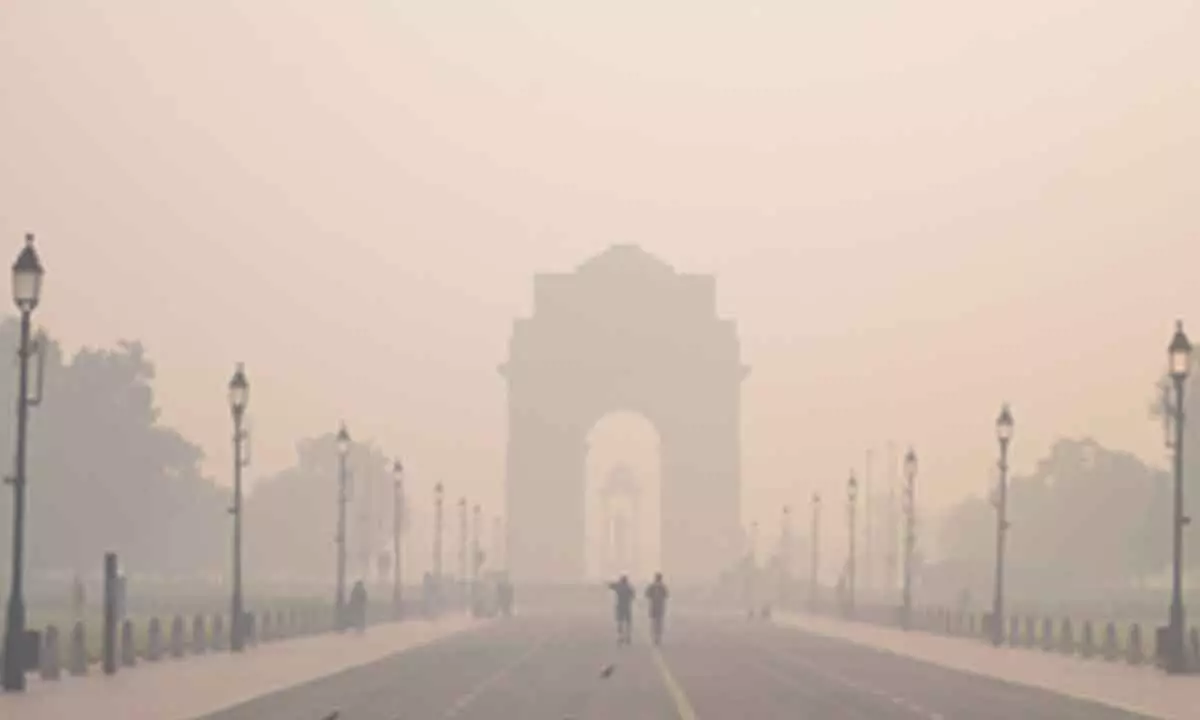Live
- AP CM Chandrababu to review on various depts today
- APSDMA predicts rains to parts of Andhra Pradesh
- Prioritising health: A call for holistic well-being
- Nurses’ services in medical field commendable: Pawan
- CHOs intensify stir, demanding fulfilment of their demands
- Apply for new ration cards: NMC Commissioner
- Buddhist philosophy has universal relevance
- SEEE top rankers get 100% fee concession
- SITAM launches ‘E-GAME’ book
- Ex-MP alleges govt role in pastor’s death

Poor air quality may not only spike respiratory, cardiac, and mental health issues but can also lead to weight gain and obesity -- a precursor to several diseases, said doctors on Monday, even as the national capital saw worse pollution levels.
New Delhi : Poor air quality may not only spike respiratory, cardiac, and mental health issues but can also lead to weight gain and obesity -- a precursor to several diseases, said doctors on Monday, even as the national capital saw worse pollution levels.
On Monday, Delhi's air quality further plummeted with the Air Quality Index (AQI) surpassing 400 in multiple parts of the national capital, placing it in the 'severe' category.
Areas including Anand Vihar (433), Ashok Vihar (410), Rohini (411), and Vivek Vihar (426) registered AQI levels above 400, according to the Central Pollution Control Board (CPCB).
Other regions like Dwarka, Patparganj, Jahangirpuri, and Punjabi Bagh also recorded 'severe' AQI levels.
Different studies have proven that an increase in PM10 & PM2.5 leads to an increase in Body Mass Index (BMI). Long-term exposure to toxic air -- consisting of particulate matter, nitrogen dioxide, and carbon monoxide -- can drive systemic inflammation and metabolic disturbances. These factors are crucial in weight gain and obesity.
Besides causing damage to the lungs, liver, and kidneys, PM2.5 can also influence metabolism rates.
The health experts noted that poor air quality can force people to stay indoors and decrease physical activity levels -- leading to obesity.
“People of Delhi are getting scared to go out of their homes. The outdoor activity of younger children who are in the growing phase of their lives, are severely restricted due to which they engage themselves in indoor activities such as playing games on the phone or watching television. Lack of physical exercise in this group of patients and overeating leads to the problem of obesity,” Dr (prof) Bobby Bhalotra, Vice Chairman, Department of Respiratory Medicine at Sir Ganga Ram Hospital, Delhi, told IANS.
He added that patients suffering from hypertension and diabetes are also at risk of weight gain.
“These patients have to do the walking as part of their treatment and they are used to walking every day to burn extra calories and keep their muscles active. Due to air pollution, they are locked inside their home and hence are gaining weight. Obesity in both of these groups of patients is mentally as physically very harmful,” Bhalotra added.
According to a recent meta-analysis published in the journal BMC Public Health, air pollution can impair metabolic function by influencing inflammation in fat tissue, increasing oxidative stress, and altering individual dietary habits, with a "negative effect on glucose metabolism" -- leading to weight gain.
“Different studies have proven that an increase in PM 10 and PM 2.5 leads to an increase in body mass index (BMI). This effect is more pronounced in adolescence where rise in obesity is related to increase in air pollution,” Dr. Vivek Bindal, Director & Head– Max Institute of Minimal Access, Bariatric & Robotic Surgery, Max Super Speciality Hospital, told IANS.

© 2025 Hyderabad Media House Limited/The Hans India. All rights reserved. Powered by hocalwire.com






